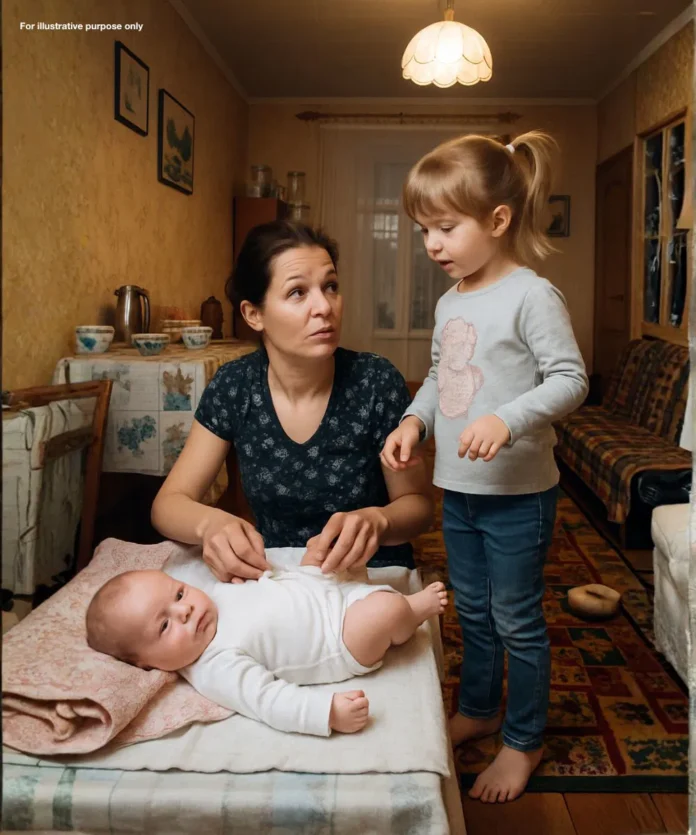That morning began like any other, until my phone rang unusually early. On the other end was my sister, her voice weak and weary. She had just given birth a few days earlier and sounded completely drained. “Can you come over for a bit?” she asked softly. “I just need a few hours of sleep.”
Of course, I said yes. My daughter and I adored that tiny new baby, and helping out felt like the most natural thing in the world.
When we arrived, my six-year-old was practically glowing with excitement. She loved being the “big cousin” and insisted on helping however she could. She gently rocked the baby, stroked her silky hair, and hummed lullabies in her sweet, off-key little voice.
The house felt peaceful—filled with soft laughter, the faint scent of milk, and the quiet rhythm of a newborn’s world.
After a while, the baby began to stir. Her tiny face scrunched up, and soon, her cries filled the room. I figured she needed a diaper change, so I laid out a clean cloth and began the familiar routine. My daughter stood nearby, eager to prove that she was “grown up enough” to help.
But as soon as I opened the diaper, I saw her expression shift. Her curious eyes turned uncertain, then frightened. She pointed hesitantly at the baby’s belly and whispered, “Mom… what’s that?”
Across the baby’s tender skin were bluish-purple marks—faint but unmistakable. My breath caught in my throat. They looked like bruises.
For a moment, I couldn’t speak. My mind raced. I turned to my daughter. “Sweetheart,” I asked quietly, “did you do this?”
Her eyes widened in shock. “No, Mommy! I just kissed her!” she said, her voice trembling.
My heart pounded. I reached for my phone and called my sister. When she answered, I tried to keep my voice steady as I explained what I’d seen.
There was silence on the other end—long enough for me to feel my chest tighten. Then, finally, she spoke. Her voice was calm but hollow.
“It was me.”
I froze. “What do you mean?”
“I did it,” she said again, almost whispering. “She cried all night. I hadn’t slept, hadn’t eaten. I didn’t mean to hurt her. I just… lost control.”
Her words hung heavy between us. I felt my throat close as I pictured her—pale, exhausted, and alone—rocking a crying infant hour after hour. Not cruel. Not careless. Just utterly overwhelmed.
In that moment, I saw the truth that so many mothers hide behind tired smiles: sometimes love and exhaustion coexist in the same fragile breath. Sometimes, even the most devoted parent can find herself at the edge of breaking.
I sat there for a long time after we hung up, the baby sleeping peacefully beside me. My sister’s pain echoed in my mind, and a deep ache settled in my chest. I realized how easily it could happen—how quickly exhaustion can twist into despair when you’re running on empty, and no one sees it.
From that day forward, I made a promise to myself. I would not let my sister face motherhood alone.
Every morning, I stopped by her house. Sometimes I’d hold the baby while she took a nap. Other times, we’d just sit together with a cup of tea and talk about nothing in particular. I helped with laundry, cooked simple meals, or just stayed long enough for her to take a walk and breathe. Slowly, her color returned, her voice grew lighter, and I began to see the sister I knew again—the one who laughed easily and looked forward to tomorrow.
It wasn’t some grand act of heroism. It was small things—simple gestures of care that made a world of difference.
As I watched her regain her footing, I learned something profound: sometimes, saving someone doesn’t mean rescuing them from disaster. It means showing up before the disaster happens. It means seeing the quiet signs of fatigue, the trembling hands, the forced smile—and offering love instead of judgment.
Motherhood, especially in those early weeks, can feel isolating. Between sleepless nights, endless feedings, and the constant worry of doing everything “right,” it’s easy to lose yourself. Too often, new mothers are told to be strong, to manage, to “enjoy every moment,” even when their hearts are heavy with exhaustion.
But strength doesn’t always mean doing it all alone. Sometimes, true strength is admitting you’re tired. It’s asking for help. And for the rest of us, it’s being the one who listens without criticism, who steps in with a meal or a warm hug, who says, “You’re not alone.”
That afternoon with my daughter and my niece changed the way I see family, motherhood, and compassion. I think back to it often—how a small question from a curious six-year-old opened my eyes to a much bigger truth.
We all carry invisible weights, and sometimes the people who seem fine are the ones quietly falling apart. What saves us isn’t perfection; it’s connection. It’s the gentle act of being there—really being there—for each other.
Now, when I look at my sister and her happy, healthy baby, I feel immense gratitude. Gratitude that she reached out that morning. Gratitude that I answered. And gratitude that love, in its simplest form, can be the thing that keeps someone from slipping too far.
In the end, that’s what family truly means—not just shared blood, but shared strength. The willingness to hold one another up when life feels too heavy to bear alone.



